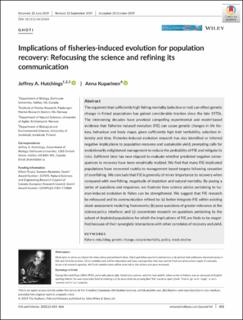| dc.contributor.author | Hutchings, Jeffrey | |
| dc.contributor.author | Kuparinen, Anna | |
| dc.date.accessioned | 2020-11-18T09:37:40Z | |
| dc.date.available | 2020-11-18T09:37:40Z | |
| dc.date.created | 2020-11-10T13:02:02Z | |
| dc.date.issued | 2020 | |
| dc.identifier.citation | Fish and Fisheries. 2020, 21 (2), 453-464. | en_US |
| dc.identifier.issn | 1467-2960 | |
| dc.identifier.uri | https://hdl.handle.net/11250/2688401 | |
| dc.description.abstract | The argument that sufficiently high fishing mortality (selective or not) can effect genetic change in fished populations has gained considerable traction since the late 1970s. The intervening decades have provided compelling experimental and model‐based evidence that fisheries‐induced evolution (FIE) can cause genetic changes in life history, behaviour and body shape, given sufficiently high trait heritability, selection intensity and time. Fisheries‐induced evolution research has also identified or inferred negative implications to population recovery and sustainable yield, prompting calls for evolutionarily enlightened management to reduce the probability of FIE and mitigate its risks. Sufficient time has now elapsed to evaluate whether predicted negative consequences to recovery have been empirically realized. We find that many FIE‐implicated populations have recovered rapidly to management‐based targets following cessation of overfishing. We conclude that FIE is generally of minor importance to recovery when compared with overfishing, magnitude of depletion and natural mortality. By posing a series of questions and responses, we illustrate how science advice pertaining to human‐induced evolution in fishes can be strengthened. We suggest that FIE research be refocused and its communication refined to: (a) better integrate FIE within existing stock‐assessment modelling frameworks; (b) pose questions of greater relevance at the science:policy interface; and (c) concentrate research on questions pertaining to the subset of depleted populations for which the implications of FIE are likely to be magnified because of their synergistic interactions with other correlates of recovery and yield. | en_US |
| dc.language.iso | eng | en_US |
| dc.title | Implications of fisheries-induced evolution for population recovery: Refocusing the science and refining its communication | en_US |
| dc.type | Peer reviewed | en_US |
| dc.type | Journal article | en_US |
| dc.description.version | publishedVersion | en_US |
| dc.source.pagenumber | 453-464 | en_US |
| dc.source.volume | 21 | en_US |
| dc.source.journal | Fish and Fisheries | en_US |
| dc.source.issue | 2 | en_US |
| dc.identifier.doi | 10.1111/faf.12424 | |
| dc.identifier.cristin | 1846537 | |
| dc.relation.project | ERC-European Research Council: 770884 | en_US |
| cristin.ispublished | true | |
| cristin.fulltext | original | |
| cristin.qualitycode | 2 | |
